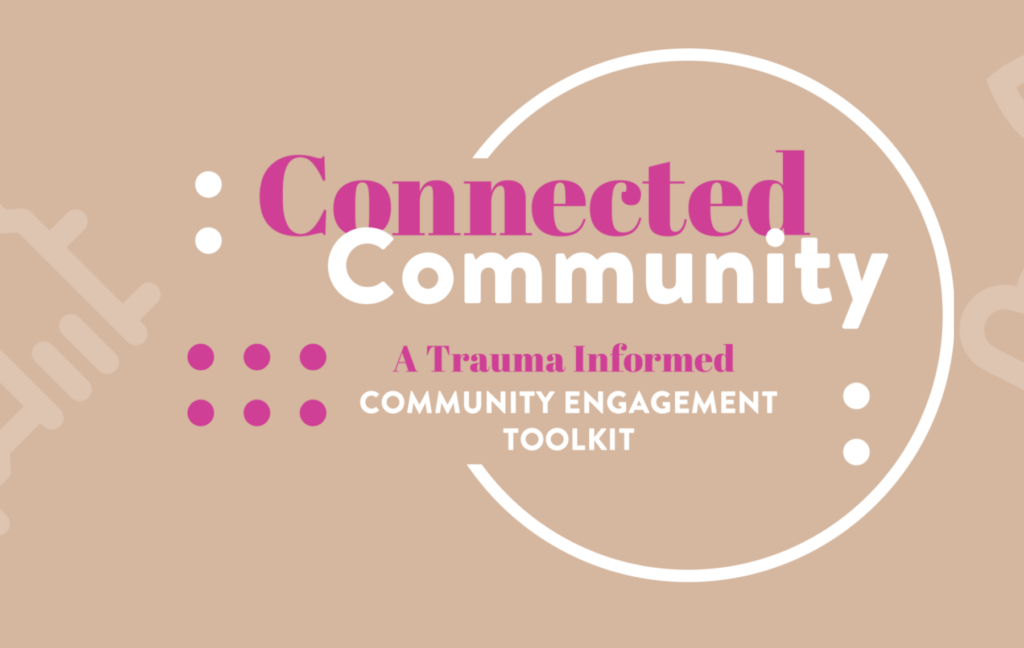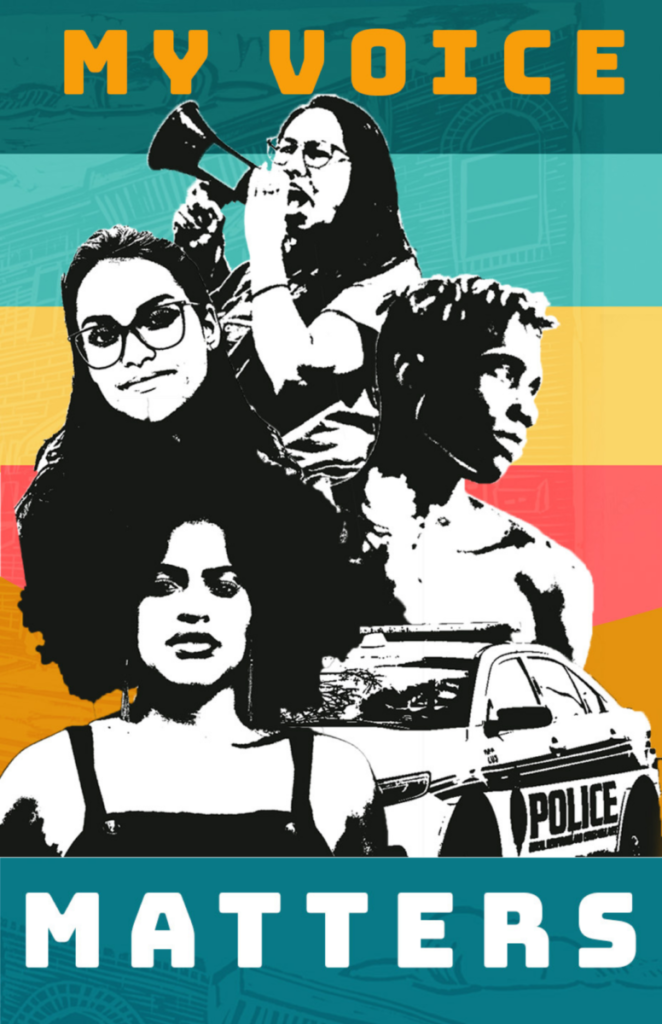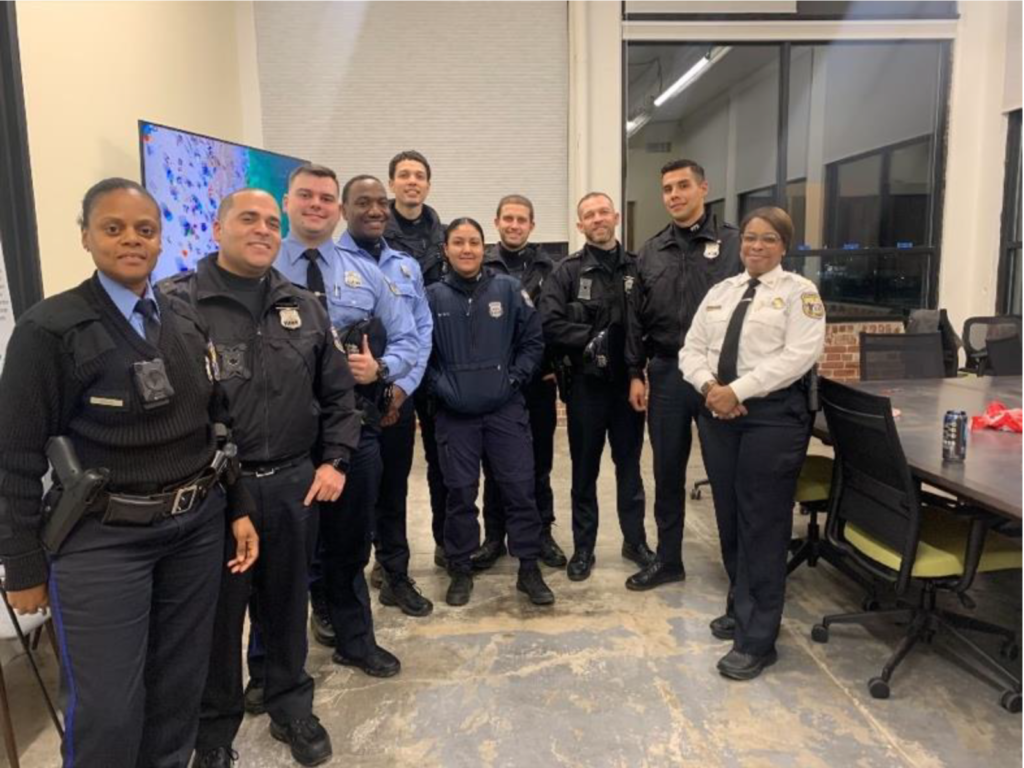“Everybody in the department should get this”
A version of this article on trauma informed training was originally published in the February 2022 Byrne Criminal Justice Innovation Bulletin
After receiving a three-year Byrne Criminal Justice Innovation award from the U.S. Department of Justice in 2018, three Philadelphia organizations—HACE, Impact Services, and NKCDC—joined together to launch We CAN (Change and Action Now) to support residents, community organizations, and police in the Kensington and Fairhill neighborhoods. Since its launch, We CAN has implemented programs and initiatives that align with three goals:

- Increasing community cohesion,
- Strengthening police and community relations, and
- Reducing physical disorder.
Kensington and Fairhill experience high levels of trauma. To ensure that work in these neighborhoods would be successful, We CAN pursued a trauma-informed model for community engagement. Over three years, Impact Services and NKCDC worked with residents and consultants to develop a curriculum that would help service providers and residents understand the impact of trauma and methods for lessening its effects. The group used a participatory, collaborative process and drew heavily upon the expertise of seven Community Connectors—local resident leaders already organizing in their neighborhoods. These efforts resulted in the launch of Connected Community: A Trauma-Informed Community Engagement Toolkit.
The Community Connectors strongly advocated for introducing the trauma-informed curriculum to Philadelphia Police Department officers working in Kensington and Fairhill. We CAN turned to a key police partner for assistance, Chief Inspector Altovise Love-Craighead, who oversees the department’s Community Relations Bureau and champions community engagement and trauma-informed policing.
Building upon her efforts in the department, We CAN collaborated with Love-Craighead, the Community Connectors, community youth, and the Creative Praxis training organization to create a Police Trauma Training Pilot Program. We CAN implemented the pilot program with support from Captain Pedro Rosario of the PPD’s 24th District, who has supported We CAN’s work since the launch of the project.

Police trauma informed training pilot program
The pilot began in summer 2021, with 11 police officers participating in five training sessions:
- Session 1—Trauma Informed Policing
Chief Inspector Love-Craighead discussed trauma-informed policing and how officers can be more trauma-aware when supporting individuals going through the criminal justice process, and in navigating their own personal traumas. She shared her experience navigating traumatic life events and how trauma has impacted her and her work. - Session 2—The Clinical Perspective of Trauma
Linda Rich M.A., a psychologist trained in the behavioral aspects of trauma, presented Adverse Childhood Experiences (ACEs), how they impact an individual’s behavior, and the effects of trauma on the brain.
- Session 3—Connected Community: A Trauma-Informed Community Engagement Toolkit
The NKCDC Community Connectors presented the trauma-informed toolkit and discussed the training curriculum with participants. We CAN Project Manager Cass Green reported that attendees were “super engaged” with the training. “I’ve never heard a room of police officers laugh so much, and we concluded later than expected due to the extensive networking that took place,” she said. - Session 4—My Voice Matters: Youth Safety Report
Six youth presented My Voice Matters: Youth Safety Report, with recommendations from 26 local youth on improving public safety. In 2021, Creative Praxis facilitated a series of workshops with young people between ages of 14-24, to discover their leading safety concerns, discuss the root causes of these issues, and advance possible solutions. An open discussion followed the presentation, with participants eager to collaborate with youth on additional recommendations. Read a summary of youth recommendations here. - Session 5—The History of Policing from a Minority Perspective
Inspector Verdell Johnson and Officer Sequitta Adams, Ph.D. gave a presentation that looked at the history of policing from a minority perspective on both the national and local levels. The presenters explored how policing has impacted people of color, specifically in Philadelphia, and the implications of historical trauma and its impact on communities and residents. For several participants, this was new information.

We CAN was intentional about creating a space where attendees would be receptive to new information and feel comfortable sharing openly. During the first two sessions, We CAN staff provided food but left the classroom when the session began. The effort seemed to pay off as presenters reported that participants were eager to discuss the training topics and share their own experiences. “Everybody should have these [trainings], everybody in the department should get this,” one participant said.
Nia Eubanks-Dixon, founder of Creative Praxis, said that the youth from session four also wanted more opportunities to share their voices and be part of the decision-making process. “We want to provide our community with tools and strategies to make our neighborhood safe,” she said.
Carrying We CAN forward
NKCDC and Impact Services hope to support additional trauma-informed training for police officers in the 24th and other Kensington police districts in the coming year. Three We CAN block leaders and Connectors are now members of the 24th Police District Advisory Commission and other residents regularly attend Commission meetings or other police-led community meetings.
The full My Voice Matters report is now available online and in bound copies, and Chief Inspector Love-Craighead has used it as a reference guide with a newly established Philadelphia Police Youth Advisory Council. We CAN partners are working to implement youth recommendations among local youth-serving organizations, police, elected officials, and national partners in community development and criminal justice.

Department of Justice funding for We CAN ends this year, but many other aspects of the program will continue with the support of community organizations.
- Monthly We CAN meetings have transitioned to local civic associations, with block leaders including community safety topics and resources at meetings of Somerset Neighbors for Better Living (SNBL), Harrowgate Civic Association, and Kensington Neighbors Association.
- SNBL is also continuing the work of the We CAN Town Watch patrol group in and around Orinoka Civic House, an NKCDC-owned apartment building on Somerset Street.
- NKCDC’s Nourish program continues to support We CAN block leaders with emergency food distribution and nutrition education.
- By Faith, Health, and Healing, a resident-led nonprofit, offers weekly trauma support for mothers and fathers at the Community Center at Visitation
Crime Prevention Through Environmental Design (CPTED) projects—which were developed, implemented, and maintained by We CAN block leaders over the past three years—continue to be spaces for hosting events and sharing resources. Residents have access to activity kits to organize events for their neighbors that support the community cohesion that the We CAN program built. HACE’s Livability Academy will train new resident leaders in SafeGrowth and CPTED principles to share in the upkeep and impact of the projects. With support from Everytown USA and LISC’s Safety and Justice program, NKCDC will support additional programming and physical improvements at two We CAN block projects through 2022.
